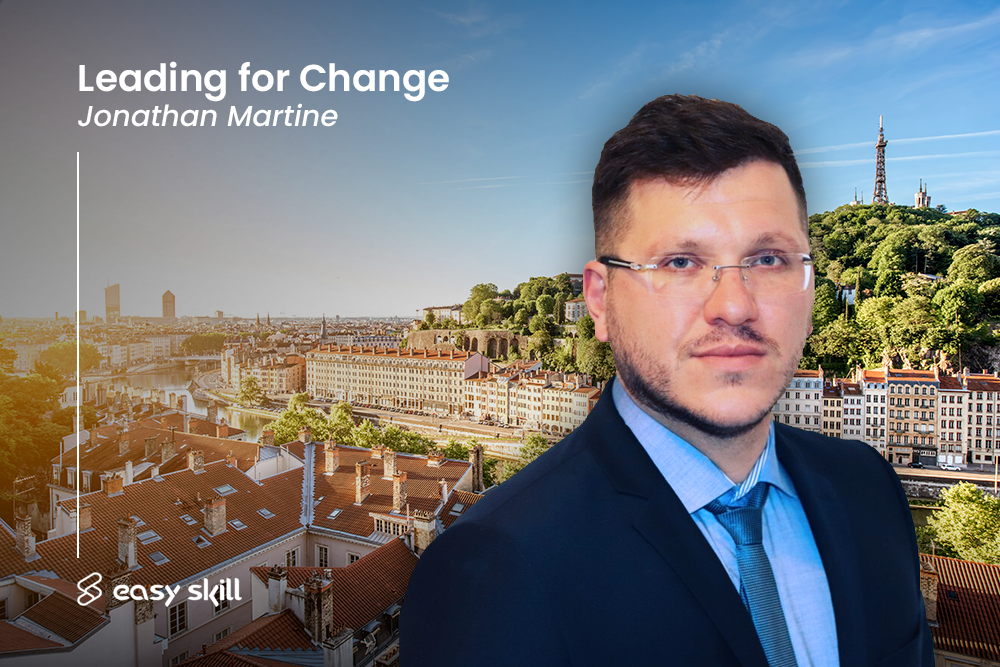The notion of sustainability has been around for a while, but real change has been slow. With our growing interconnectivity, the health of the planet and its people has become urgent. While we are seeing social and regulatory changes that push an environmentally responsible agenda, more power is needed by businesses.
Every brand has a responsibility to contribute to the global conversation. And even more importantly, to start taking big action. Like Simon Sinek said, it starts with why. When companies can figure out why it matters to them, it will become easier to define their unique strategy and the details of their individual contributions. So in light of that, I teed up an interview today with Pierre Bussy, cofounder of Easy Skill to share his point-of-view.
When we say sustainability what does that mean to you?
For me sustainability is about leaving the world better than we found it. As the father of two young daughters, I’m inspired to leave them a healthy planet where they can grow up and flourish. As a business leader, I recognize our duty to redefine the purpose of our businesses in a wider scope that aligns commercial success with a healthy planet. We need to be proactive in shaping the future we want.
What do you think the biggest issue is?
The lack of unity in accepting the realities of climate change. Many people are not fully aware of the stark realities and the risks that lie ahead if we don’t make serious changes. We’re approaching a point of no return. And that’s a scary thought because we cannot create the magnitude of change we need alone. We need to rely on each other. Sustainable actions are an absolute necessity. We need awakening. Then we need to move forward quickly and collectively.
What do you think is the most overlooked?
Our conversation needs to expand beyond carbon reduction. Creating fewer harmful emissions is a critical priority, but we also need to think about how we’re using our raw materials. The Earth has a finite supply and so we need to adopt a long-term perspective that changes our current usage levels and switches to sustainable consumption. Intelligent global consumption is a key component.
What do you think about a green economy?
There are a lot of misconceptions that a green economy will reduce overall prosperity by lowering consumerism. But that’s a myth. In the face of finite resources, we need to untangle the idea of environmental prosperity leading to a shrinking economy. By becoming more efficient with how we consume resources, we can maintain current levels or even sustain an increase without causing extra strain on the planet.
What will replace consumerism to fuel the economy?
Innovation is the key and design thinking. Shifting to lower-carbon production and sustainable sourcing will drive critical investments. Replacing linear usage with closed loops, we’ll use our finite resources in a smarter way while reducing waste, contaminants, and planet damage. We’ll transfer our investments into the knowledge economy to change how we do things. And although we’re investing heavily in resource exploitation today, we’ll soon be investing far more in resource protection and optimisation.
What’s your personal commitment?
For as long as I can remember, I’ve personally held values to advance sustainability as an individual and as a family. Now I’m elevating my thinking to gain insights into the opportunities to drive change on a bigger scale. I’m finishing a course from the University of Cambridge on Sustainable Leadership because I’m ready to drive bigger change. This course has accelerated my conscious journey. I catch myself pondering new sustainable ideas every single day.
What are you doing as a company?
In 2021, we launched the Legacy Project and we’re really excited. We’ve always been a company that helps clients to shape a better future, so taking that to the next level is in our DNA. Today we’re in the infancy stages, but we’ve committed to creating a positive contribution that extends far beyond our lifetime. We’re here to make an impact on the world and be a force for good.
Can you elaborate on the Legacy Project?
Sure, let me introduce you to the 3Ps. We have three main pillars to make an impact – across people, the planet, and prosperity. People: we’re here to help our team unlock their true potential and teach them entrepreneurial skills. This will help them realise what’s possible and have the knowledge and skills to achieve it. Planet: we’re committed to reducing our carbon footprint and achieving a goal of carbon-neutral by 2030 or earlier. Prosperity: we’re committed to giving back to the communities in which we operate to raise the bar for standards of living across education, social, and economic levels.
Decarbonisation is a big topic. What’s your take on it?
The supply chain is full of opportunities to make big strides. From reducing raw materials needed to re-engineering manufacturing processes to designing with end-of-life in mind, there’s so much to tackle. It really comes down to addressing the full lifecycle of a company’s products and services. When we start with the end in mind, we’ll be leveling up our progress towards decarbonisation.
Are you concerned with greenwashing?
To some extent yes. It’s critical for companies to set realistic and transparent targets, then to publish them. This will enroll everyone in feeling a sense of accountability towards achieving these milestones and create awareness. Public sharing will help clients, shareholders, and future employees make informed decisions about what companies to team up with and support. And ultimately, the utopia is that market leaders will raise the standards and influence others to do the same.
What gives you the most hope?
Changing consumer demands. Consumers are becoming more ethically and environmentally conscious and that means they’re demanding the same from their products and services. With pressure coming from all angles, achieving real transformation will become necessary rather than a luxury. And this is where the magic will happen.
Environmental reform is a massive undertaking. It means making big changes to how we work, our technologies, and our cultural values. For businesses, there’s a bigger calling. Companies need to shift their focus away from traditional thinking to maximize revenue and profits. And include a sustainable approach that becomes engrained inside the core business. Climate change has shown us the big opportunity for companies to make a positive impact on society as a whole.

Samantha Shah
Chief Marketing Officer
Our chief value creator with a knack for finding meaning everywhere. She bends words to create clarity while making a lasting impression. She can also make you laugh. An exiled Canadian now living in Australia, she enjoys the heat but misses snowboarding and the apres ski.








Share this Article